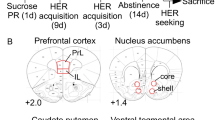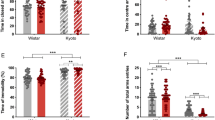Abstract.
Rationale: This study was based on the findings of a high comorbidity among anxiety and depression as well as with alcohol abuse. Objective: To evaluate first exposure alcohol preference in a rodent model of moderate neonatal maternal separation. Methods: Rat pups were exposed to either normal animal facility rearing (AFR) or 15 min (HMS15) or 180 min (HMS180) of maternal separation from postnatal days 2–14. The adult (>60 days) male Long Evans progeny was tested for pituitary–adrenal axis responsiveness to airpuff startle, anxiety-like behavior in the elevated plus maze, and alcohol preference using a two-bottle, free-choice test. Results: In response to home cage airpuff startle, HMS180 rats displayed an elevation in the integrated adrenocorticotropic hormone and corticosterone responses. In addition, HMS180 rats spent less time in the open arms and more time in the closed arms in the elevated plus maze. HMS180 rats drank significantly less of a water–sucrose solution and significantly more of an ethanol–sucrose solution than AFR or HMS15 rats. No rearing group differences were observed in total fluid intake. The integrated corticosterone response to airpuff startle was highly correlated with ethanol consumption and there was a negative correlation between percentage of time spent in the open arms of the elevated plus maze and ethanol consumption. Treatment with the selective serotonin reuptake inhibitor paroxetine for 21 days eliminated differences in the elevated plus maze and HPA axis responsiveness, and significantly reduced the amount of ethanol consumed by the HMS180 rats, without affecting these parameters in the HMS15 rats. Conclusions: These observations suggest that this maternal separation paradigm is a good model to study the effects of early adverse experience on the development of alcohol preference and anxiety.
Similar content being viewed by others
Author information
Authors and Affiliations
Additional information
Electronic Publication
Rights and permissions
About this article
Cite this article
Huot, R.L., Thrivikraman, .K., Meaney, M.J. et al. Development of adult ethanol preference and anxiety as a consequence of neonatal maternal separation in Long Evans rats and reversal with antidepressant treatment. Psychopharmacology 158, 366–373 (2001). https://doi.org/10.1007/s002130100701
Received:
Accepted:
Issue Date:
DOI: https://doi.org/10.1007/s002130100701




